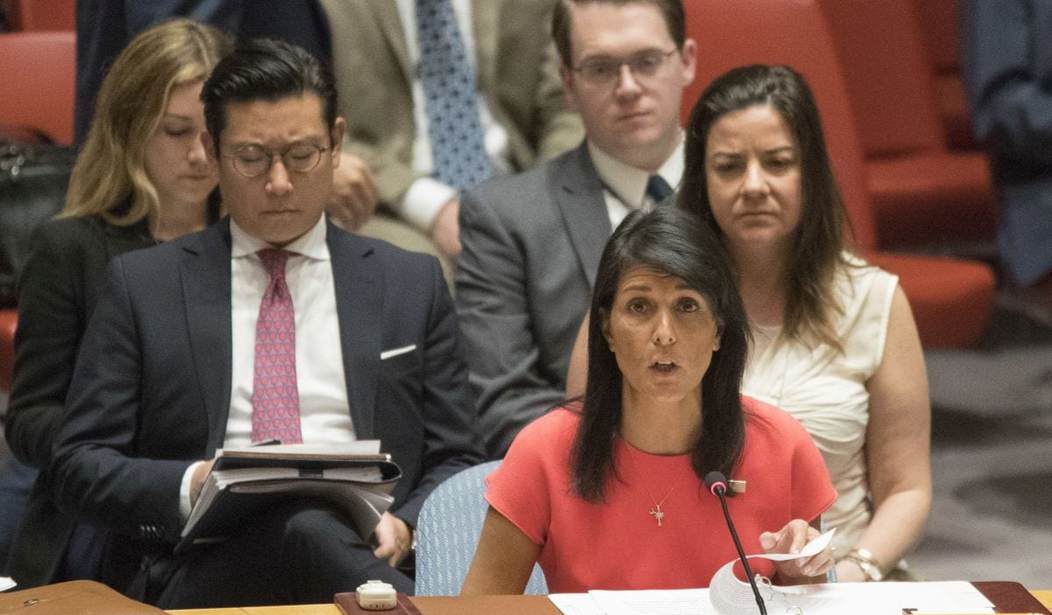The United Nations Security Council unanimously passed a sanctions resolution on North Korea on Saturday that targets their coal and other exports worth more than a billion dollars.
UN Ambassador Nikki Haley negotiated with the Chinese and Russians over the last several weeks to flesh out the scope and extent of the sanctions to be imposed. In the end, both nations voted with the U.S. to punish North Korea for their recent missile tests.
Russia and China are usually reluctant to vote for sanctions, believing them to be unproductive. But the crisis has forced the Chinese to realize that more pressure on Kim Jong Un is necessary if conflict is to be avoided.
The Security Council unanimously approved the sanctions on North Korea, including banning coal and other exports worth over $1 billion.
The US-drafted measure, negotiated with North Korea’s neighbour and ally China, is aimed at increasing economic pressure on Pyongyang to return to negotiations on its nuclear and missile programs.
Mr Trump wrote on Twitter that China and Russia voted with the US to pass what he called “the single largest economic sanctions package ever” on North Korea.
Mr Trump’s national security adviser, HR McMaster, stressed in an interview that aired earlier in the day that it is “impossible to overstate the danger” posed by North Korea.
In an interview with MSNBC’s Hugh Hewitt, Mr McMaster said Mr Trump has been “deeply briefed” on the strategy on North Korea.
Tensions have mounted with Pyongyang’s two recent successful tests of intercontinental ballistic missiles.
Mr McMaster reiterated the administration’s position that all options, including a targeted military strike, are on the table.
Still, he acknowledged this “would be a very costly war, in terms of … terms of the suffering of mainly the South Korean people”.
McMaster continued: “So what we have to do is — is everything we can to — to pressure this regime, to pressure Kim Jong Un and those around him such that they conclude it is in their interest to denuclearise.”
The comments came as Secretary of State Rex Tillerson was in the Philippines for a regional summit expected to focus heavily on concerns with North Korea.
Mr Tillerson has no plans to sit down with North Korean Foreign Minister Ri Yong Ho at the event.
He said this week that such talks would have to be predicated on the North giving up its nuclear weapons aspirations and that the conditions for such talks have not yet been met by North Korea’s Government.
This is a significant development with China and Russia, which rarely vote with the U.S. on sanctions. But Ambassador Haley was able to satisfy Russia that we were not out for regime change in North Korea. And Haley gave China a little on language that urges a dialogue with the Kim regime and a peaceful resolution to the crisis.
But the two nations still criticized the U.S. after Secretary of State Tillerson made it clear there would be no negotiations with North Korea until they agreed to end their nuclear and missile programs.
Liu alluded to those comments and said that the United States needs to take concrete steps to prove their sincerity. He took particular aim at American military exercises with South Korea and the deployment of a missile defense system that China fears could be used against their own weapons. “Beefing up a military deployment around the peninsula is not in the interests of realizing denuclearization of the peninsula and maintaining peace and stability,” he said.
Russia’s representative to the security council blamed the U.S. more bluntly. “All must understand that progress towards denuclearization of the Korean peninsula will be difficult so long as [the North Korean regime] perceives a direct threat to its own security,” Ambassador Vasily Nebenzia said. “For that is how the North Koreans view the military build up in the region, which takes on the forms of frequent, wide-ranging exercises and maneuvers of the U.S. and allies as they deploy strategic bombers, naval forces, and aircraft carriers.”
So North Korea sets off several nuclear bombs and launches ICBMs that could hit the US — and it’s our fault that the Korean Peninsula is on a war footing?
We can’t help it that Kim is a paranoid loon and that his gangster regime routinely makes the most bloodcurdling threats against the United States. As for China’s pious importuning for “dialogue,” this has been the pattern since Bill Clinton was president. North Korea commits some overt act that precipitates a crisis and then expects the U.S. to sit at the negotiating table while they extort food, fuel, and anything else from the U.S.
Those “negotiations” have done absolutely nothing to stop North Korea from building a nuclear weapon or developing missiles that can hit the U.S. It’s time more concrete action was taken — and Russia and China should be applauded for recognizing that.










Join the conversation as a VIP Member